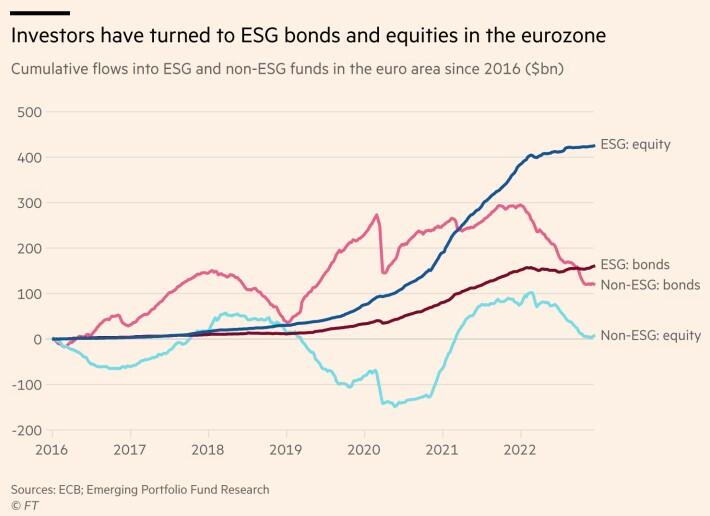ESG ETF Inflows Slow Quicker Than The Broader ETF Industry As "Greenwashing" Concerns Mount

All it took was the collapse of the woke, green Silicon Valley Bank for regulators to begin to ponder how ESG labels may not have exactly been the best way for retail investors to be allocating their capital over the last few years.
As it turns out, companies can label themselves ESG at will, but some are stunned to find out the label doesn't actually carry with it the guarantee of acumen on how to run a business or generate any actual cash. Go figure.
This is probably the way regulators are finally starting to warn about “greenwashing”, or what the FT referred to this weekend as "using misleading environmental claims to entice well-meaning customers."
As most already know, the number of ETFs sporting an ESG tag has "more than doubled in the past two years" in London. While some funds are militant and are "designed to be compatible with the Paris Agreement goal of limiting global warming to 1.5C", others maintain exposure to fossil fuel companies while honing in on other ESG "thematics", the report says.
This gray area has led to some companies taking advantage of the label. Deborah Fuhr, the founder of ETFGI, a London-based consultancy, told FT: “The speed of product proliferation means that investors have to do their homework with real care to ensure that they choose an ESG ETF that matches their needs and expectations.”

ESG ETF inflows dropped disproportionately compared to the overall drop in the ETF industry's inflows. The former fell 54.5%, while the latter fell just 33.7%. FT says that political pressure on ESG funds, along with an "increasingly fractious debate over ESG standards", has started to slow investor demand.
Regulatory standards have shown that "greenwashing was occurring but it remains difficult to say if this was deliberate or unintentional," according to Amin Rajan, chief executive of the investment consultancy Create Research.
New guidance on what constitutes ESG would be “welcomed by the [fund] industry, although some will likely think this has come too late," added Raza Naeem, a partner at the law firm Linklaters.
“Some asset managers will be relieved that the Commission has decided against imposing minimum standards, as the onus remains on product providers to determine the level of sustainable investments in each of their funds based on their own methodologies,” Hortense Bioy, global director of sustainability research at the data provider Morningstar, told FT.
She added: “Some other managers would prefer to have seen minimum requirements, as that would have levelled the playing field and been easier for end-investors. Investors will now have to do more due diligence to understand the methodologies used. Investors may also be confused by the flip-flopping that we are likely to see over fund classification.”
Rajan concluded: “We are witnessing the birth pangs of a new form of investing which involves big value judgments. The definition of a ‘good company’ varies greatly between different countries and cultures. ESG data disclosures and reporting will improve due to pressure from investors, regulators and company directors who have a fiduciary duty to shareholders.”
More By This Author:
US Home Price Growth Slowest In A Decade, San Francisco Crashes
Bed Bath & Beyond Files For Chapter 11 Bankruptcy
Ethereum: Goldman's Shapella Upgrade Post-Mortem (& What Happens Next)
Disclosure: Copyright ©2009-2023 ZeroHedge.com/ABC Media, LTD; All Rights Reserved. Zero Hedge is intended for Mature Audiences. Familiarize yourself with our legal and use policies ...
more


